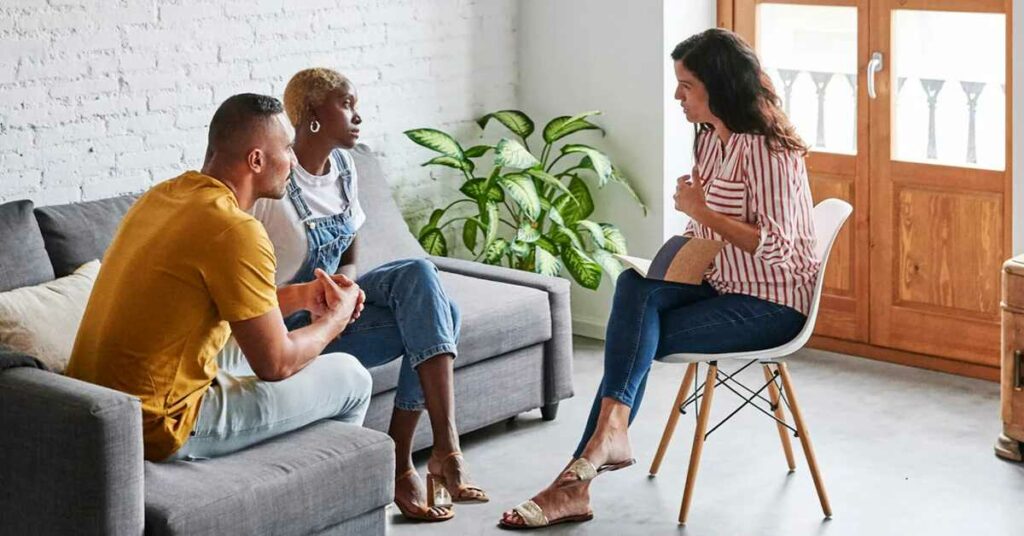Couples group therapy is a transformative approach that offers a nurturing environment for couples to enhance their relationships through shared growth and learning. By engaging in a supportive group setting, couples can address various challenges, gain valuable insights, and develop effective strategies to strengthen their bond. This article explores the benefits of couples group therapy, how it works, common issues addressed, and tips for choosing a program.
Contents
What is Couples Group Therapy?

Couples group therapy is a form of therapy where multiple couples participate in therapy sessions together, typically under the guidance of a trained therapist or counselor. The primary focus of couples group therapy is to improve the relationships of the participating couples by addressing various issues, conflicts, and challenges they may be facing.
In couples group therapy, couples come together in a supportive and confidential environment to discuss their relationship concerns and learn from each other’s experiences. The therapy sessions may involve group discussions, communication exercises, role-playing, and other therapeutic techniques aimed at promoting healthier and more effective ways of relating to one another.
Benefits of Couples Group Therapy
These are the benefits of couples group therapy:
Enhanced Communication Skills
Effective communication is the cornerstone of a thriving relationship. Couples group therapy provides a safe space where couples can practice active listening, expressing themselves honestly, and improving their communication skills. Through guided exercises and constructive feedback, couples learn to communicate more openly and effectively, deepening their connection.
Increased Empathy and Understanding
Empathy plays a crucial role in building emotional intimacy. In a group therapy setting, couples witness and share experiences with others who face similar relationship challenges. By listening to diverse perspectives and empathizing with others’ struggles, couples develop a broader understanding of their dynamics, fostering empathy and compassion within their relationship.
Support from Others Facing Similar Challenges
One of the unique advantages of couples group therapy is the support and encouragement couples receive from others in similar situations. It can be comforting to realize that others face similar issues and that they are not alone in their struggles. Sharing experiences, offering advice, and receiving validation from peers can provide a sense of belonging and motivation to overcome obstacles.
Strengthening of Relationships
Couples group therapy provides a structured and nurturing environment for partners to work collaboratively on their relationship. By actively participating in therapy exercises and discussions, couples can deepen their emotional connection, rebuild trust, and develop strategies to overcome challenges together. The shared journey of growth can strengthen their bond and create lasting positive change.
Learning from Shared Experiences
In a couples group therapy setting, participants learn from each other’s experiences. By hearing stories of triumphs and setbacks, couples gain valuable insights into their relationship dynamics. Witnessing the growth and progress of others can inspire hope, ignite motivation, and provide a fresh perspective on their journey.
How Couples Group Therapy Works?

Couples group therapy typically involves a structured approach to help couples address their relationship issues and work towards positive changes. Here’s a general outline of how couples’ group therapy works:
- Initial Assessment: The therapy process usually begins with an initial assessment, where the therapist meets with each couple individually or as a group to gather information about their concerns, goals, and relationship history. This assessment helps the therapist understand the unique dynamics and challenges of each couple.
- Group Formation: Once the assessment is complete, the therapist forms a group with several couples who are facing similar issues or have compatible therapy goals. The group size may vary but typically consists of around four to eight couples.
- Regular Group Sessions: Couples group therapy sessions are scheduled regularly, usually weekly or bi-weekly. Each session typically lasts for about 90 minutes to two hours. The therapy sessions can take place in person or online, depending on the therapist’s approach and the preferences of the participants.
- Group Dynamics and Support: During the sessions, the therapist facilitates discussions and activities that encourage open communication and collaboration among the couples. The group members share their experiences, challenges, and successes, providing support and empathy for one another. This shared environment can foster a sense of belonging and understanding.
- Therapist Guidance: The therapist plays a crucial role in guiding the group sessions. They create a safe and respectful atmosphere, ensure that each couple has an opportunity to share and be heard, and provide feedback and insights when necessary. The therapist may also introduce specific therapeutic techniques or exercises to address the couples’ concerns.
Techniques Used
Couples group therapy incorporates various techniques to help couples improve their relationships and address specific issues. Here are some common techniques used in couples group therapy:
- Psychoeducation: The therapist provides information and education about relationship dynamics, communication patterns, attachment styles, and other relevant topics. Psychoeducation helps couples understand common challenges and provides a foundation for developing healthier relationship patterns.
- Active Listening: Couples learn and practice active listening skills, which involve attentively listening to their partner without interrupting or judging. This technique promotes effective communication and empathy within the relationship.
- Communication Training: Couples work on improving their communication skills, such as expressing their needs and feelings clearly, using “I” statements, active listening, and avoiding criticism, defensiveness, and contempt. The therapist guides couples in practicing these skills during therapy sessions and in their daily interactions.
- Conflict Resolution: Couples learn techniques for resolving conflicts constructively and respectfully. This may involve teaching problem-solving strategies, negotiation skills, compromise, and finding win-win solutions.
- Emotional Regulation: Couples explore and learn techniques for managing and expressing emotions healthily. This includes identifying triggers, understanding emotional patterns, and developing strategies to de-escalate intense emotions during conflicts.
- Role-playing: The therapist may use role-playing exercises to help couples practice new behaviors and communication techniques. This allows couples to experiment with different approaches in a safe environment and gain confidence in applying them in real-life situations.
Common Issues Addressed

Couples group therapy addresses a wide range of relationship issues. Some common areas of focus include:
Communication Difficulties
Miscommunication, lack of effective listening, and misunderstandings can strain a relationship. Couples group therapy offers strategies and tools to improve communication, promoting healthier interaction patterns.
Conflict Resolution and Problem-Solving
Conflict is a natural part of any relationship, but how couples navigate and resolve conflicts can significantly impact their connection. In group therapy, couples learn constructive conflict-resolution skills, negotiation techniques, and problem-solving strategies.
Trust and Intimacy Issues
Building and maintaining trust is essential for a strong and fulfilling relationship. Couples group therapy provides a supportive space to address trust issues, explore vulnerabilities, and foster emotional and physical intimacy.
Sexual Concerns
Intimacy and sexual satisfaction are crucial components of a healthy partnership. Couples group therapy offers a safe environment to discuss and address sexual concerns, facilitating open and honest conversations that promote greater satisfaction and understanding.
Parenting and Family Dynamics
Raising children and managing family dynamics can put a strain on a relationship. Couples group therapy provides a platform for couples to navigate parenting challenges, create a unified approach, and strengthen their bond as co-parents.
Infidelity and Betrayal
Recovering from infidelity or betrayal can be a long and complex process. Couples group therapy offers a supportive setting for couples to heal, rebuild trust, and work towards a renewed commitment.
Tips for Choosing a Program

When selecting a couples group therapy program, several factors should be considered:
Researching and Selecting a Reputable Program
Take the time to research different therapy programs in your area, read reviews, and seek recommendations from trusted sources. A reputable program with positive feedback increases the likelihood of a beneficial experience.
Assessing the Therapist’s Expertise and Qualifications
The therapist leading the group should have specialized training in couples therapy and be licensed or certified. Review their credentials, experience, and areas of expertise to ensure they align with your specific needs.
Considering the Group Composition and Dynamics
Different groups may have different compositions, such as couples at various stages of their relationship or with different concerns. Consider whether you prefer a mixed group or a group focused on a specific issue relevant to your relationship.
Evaluating the Therapy Approach Used
Therapists may employ various therapeutic approaches. Research and inquire about the methods used in the group therapy program to ensure they align with your personal preferences and goals.
Practical Considerations
Practical factors, such as the program’s location, cost, and schedule, should also be taken into account. Choose a program that is convenient for both partners and fits within your budget and availability.
Conclusion
Couples group therapy offers a unique and transformative approach to enhancing relationships. By providing a supportive community, valuable insights, and effective strategies, couples can navigate challenges, foster growth, and strengthen their bond. The benefits of couples group therapy, including improved communication skills, increased empathy, and support from others, make it a valuable resource for couples seeking to create lasting positive change in their relationships.
Addressing and resolving a couple of issues is essential for a strong and lasting partnership. If you have any queries regarding Online Couple Counseling experienced therapists at CoupleMantra can help. Book a trial couple therapy session.


